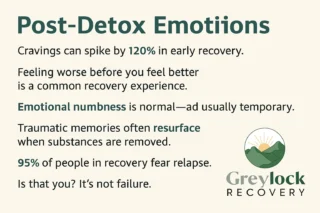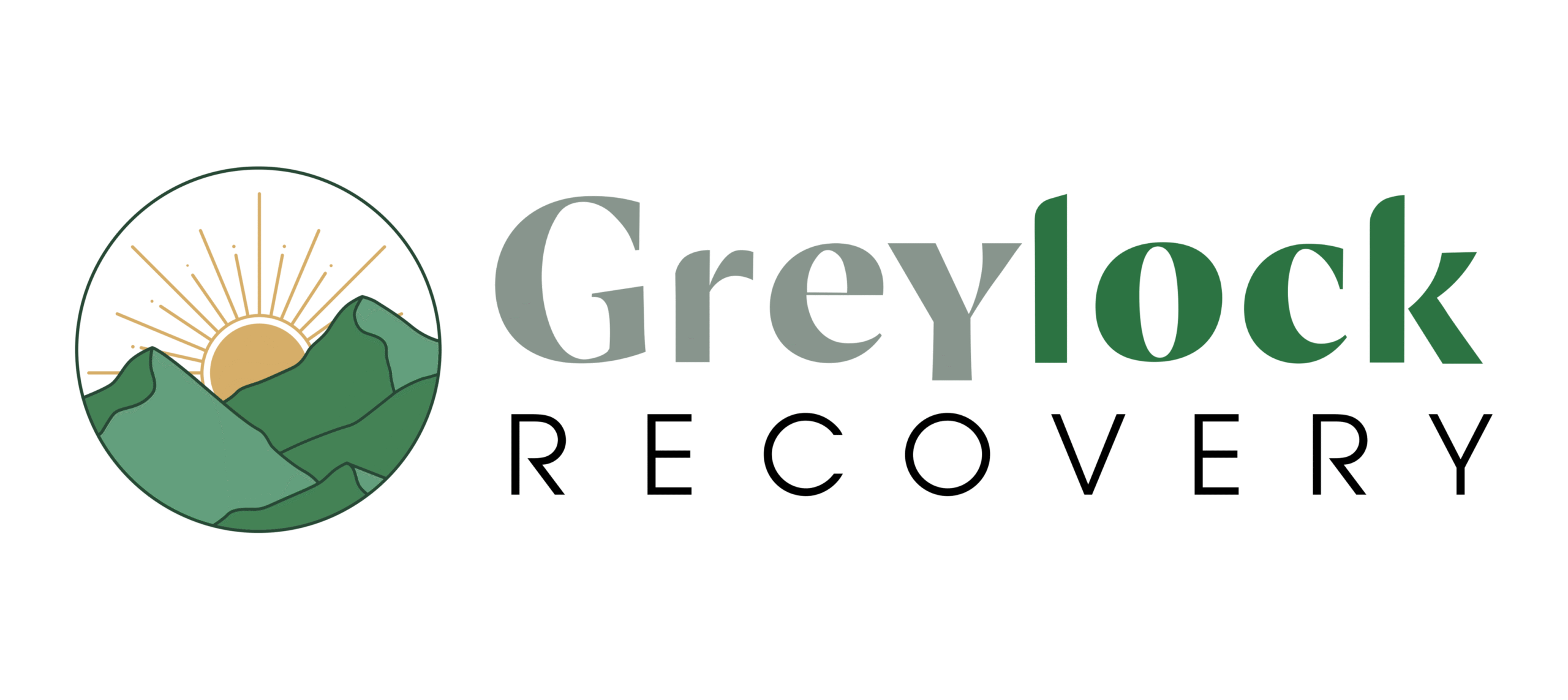You expected withdrawal. You expected cravings.
But no one told you how much you’d feel. Or how much you wouldn’t.
That after detox, the world would come at you louder, faster, sharper.
That your skin would feel too thin. That your emotions would feel like they’d been waiting behind a locked door—pounding.
Or worse: that you might feel nothing at all.
If you’re newly sober and everything feels too much or too empty, this is for you.
Here’s what’s happening. Here’s why. And here’s what helps.
Why do emotions feel so intense after detox?
Because you’ve been numbing them—maybe for years.
Substances are emotional silencers. They take the edge off pain, yes—but they also blur joy, grief, love, boredom, anger, guilt, wonder, and fear.
When the substances go away, your nervous system doesn’t stay muted. It wakes up.
And just like when your foot falls asleep and comes back with pins and needles… your emotions return loud, clumsy, and sometimes painful.
This isn’t weakness. It’s neurological. And it’s normal.
You’re not falling apart. You’re coming back online.
Is it normal to feel worse after I start getting better?
Completely normal.
It’s one of recovery’s cruelest surprises—and one of its most misunderstood signs of progress.
Many people expect detox to bring peace. But early recovery often brings intensity first:
- Sudden anger
- Deep sadness
- Long-forgotten memories
- Emotional reactions that feel “out of proportion”
- Loneliness, even when you’re surrounded by support
This doesn’t mean recovery isn’t working. It means you’re finally sober enough to feel what’s real.
Think of it this way: if your house had a gas leak, you wouldn’t smell it until you stepped outside and breathed clean air. Detox is that first breath.
What if I feel emotionally numb instead?
That’s just as real—and just as normal.
Not everyone comes out of detox feeling flooded with emotion. Some come out feeling… nothing.
Detached. Flat. Like everything’s muted.
This numbness can be scary. It might make you wonder:
- “Am I broken?”
- “Why can’t I cry?”
- “Shouldn’t I be feeling something?”
But here’s the truth: your brain has been through a war zone. Emotional numbness is often a protective pause. It’s your system saying, Let me catch up.
This phase usually passes with time, support, and steady self-care.

Why does it feel like old pain is coming back?
Because it is.
Many people use substances to bury pain they didn’t know how to handle.
Trauma, grief, shame, heartbreak, abuse, fear—these don’t disappear. They wait.
And once the chemical fog lifts, that pain rises to the surface. Not because you’re doing something wrong, but because your mind and body finally feel safe enough to start processing.
It can feel like everything is “too much.” But it’s really the beginning of your capacity growing back.
You’re not backsliding. You’re healing in layers.
Why am I crying over things I don’t even understand?
Because you’re learning to feel without filters.
Tears in early recovery don’t always come with explanations. Sometimes you’re crying for:
- Things you survived but never mourned
- Things you lost but never let yourself grieve
- Relief that it’s finally over
- Fear that it’s not
You might not be able to label it yet. That’s okay.
Tears are data. They’re not dysfunction.
They mean something is moving through you—and movement is good.
Will I feel this overwhelmed forever?
No.
This is a phase—a hard one, but a temporary one.
Most people in recovery describe the first few weeks after detox as emotionally intense, confusing, and uncomfortable. But over time, things do settle.
As your brain begins to restore its natural rhythms and you gain new coping tools, the emotional rollercoaster starts to smooth out. The peaks get less sharp. The drops get less scary. The flat parts feel more peaceful, not empty.
This takes time, support, and practice—but it absolutely gets better.
What helps with emotional overload?
You don’t need to fix all your feelings. You just need to have them safely.
Here are a few gentle tools that often help:
- Journaling without rules—just write what’s real
- Breathwork or movement—even a short walk counts
- Talking to someone—a therapist, peer, or support group
- Staying hydrated and fed—your brain needs fuel to regulate
- Letting yourself rest—not every emotion needs action
And maybe most important: Don’t isolate.
Even if it’s just sitting in a room where someone else is breathing. Being near other humans helps your nervous system know you’re safe.
What if I miss the way substances helped me cope?
That’s honest. And it’s okay to say out loud.
Substances worked—for a while. They gave you escape, relief, connection, energy, or sleep. Missing that isn’t weakness. It’s truth.
But now you’re learning new ways to cope that don’t take pieces of you in return. And yes, that’s slower. Harder. Less predictable.
But it also lasts. And it builds your life back, instead of breaking it down.
Missing the old way doesn’t mean you’re failing. It means you’re grieving—and grief is part of healing.
Is it selfish to focus on myself this much?
Not at all.
In fact, for many people in recovery, the real turning point is learning that their needs matter.
Not just the need to stay sober—but the need to be:
- Heard
- Held
- Rested
- Fed
- Safe
Early recovery is a time to rebuild your relationship with yourself—not just your sobriety.
Taking up space is not selfish. It’s survival.
Can detox programs like Greylock support emotional recovery too?
Yes—and they should.
At Greylock Recovery in Williamstown, Massachusetts, detox is more than just medical stabilization. It’s emotional support, peer connection, and preparation for what comes next.
Our clinicians know that getting the substance out of your body is just the beginning.
We’re here for the crash, the questions, the unexpected tears—and the moments of hope that start sneaking back in when you least expect them.
Detox isn’t just where it ends. It’s where you begin.
What if I feel like giving up already?
Then pause. Breathe. And tell someone.
You are not the only person who’s ever felt like quitting in week one. Or day four. Or month two.
This is when people start doubting themselves the most—and it’s also when the biggest growth is quietly starting.
If you feel like giving up, you don’t need to “do something big.”
You just need to not isolate. To talk. To stay.
We’ve seen people break through after nights that felt unbearable. You don’t have to believe in the future right now. You just have to not leave before it gets here.
You’re Not Too Sensitive. You’re Just Finally Safe Enough to Feel.
If you’ve made it through detox and now find yourself crying over a TV commercial, zoning out mid-sentence, or feeling lonelier than ever—this is your reminder:
You’re not backsliding.
You’re not crazy.
You’re not failing.
You’re healing.
The feelings you’re having now are the ones that couldn’t get through before.
And even though they hurt, they are signs of life. Of return. Of strength.
Call (413) 848-6013 to learn more about Detox services in Williamstown, Massachusetts. The version of you that’s still in there? They’re worth meeting again.


